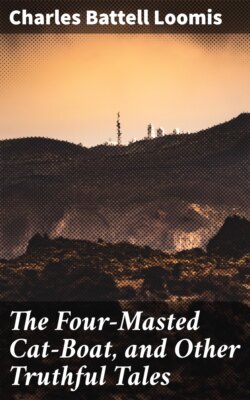Читать книгу The Four-Masted Cat-Boat, and Other Truthful Tales - Charles Battell Loomis - Страница 13
На сайте Литреса книга снята с продажи.
ОглавлениеIX
INSTINCT SUPPLIED TO HENS
A company has just been formed in New Jersey for the purpose of supplying instinct to hens. Such well-known farmers as Frank R. Stockton, Russell Sage, and Bishop Potter are stockholders in it, and if filling a long-felt want is all that is needed, the success of the company is already assured.
No one who has ever dabbled in hens needs to be told that the gallinaceous birds have no instinct whatever. Some have blind luck, but a hen with instincts in good working order would be an anomaly.
I visited Mr. Stockton at his extensive farm in New Jersey in order to find out what I could about the project. I found him in a frock-coat and overalls, training a squash-vine up a maple-tree. He greeted me cordially, and asked me to come and see his tomato-trenches. He also showed me quite an extensive area covered with birch poles for his radishes to climb on. He was very urbane, and willingly told me all about the company.
“No man,” said he, sitting down on one of his largest cucumbers and motioning me to a seat on another, “who has ever kept hens but has wondered why they were not provided with a good commonsense brand of instinct. No animal needs instinct more than a hen. It was to supply this need that our company was formed. You know that if you put a hen on cobblestones, she will brood over them with all the devotion possible, and if at the end of three weeks you put a baby chicken under her, her—what you might term false instinct—will cause her to cluck and call to the cobble to come forth and follow her.”
I admitted the force of his remark, because when a boy I had once set a hen on some green apples, and she had covered them without a murmur for a week, when I took pity on her and replaced them with real eggs. The following day, not liking the feeling of the eggs, she left them, and gathering together the apples that I had left scattered upon the barn floor, she sat on them again.
I told this experience to Mr. Stockton, and he said: “If she’d had a few of our instinct-powders before sitting she would have repudiated the fraud at once. Is it instinct, or the lack of it,” he continued, “that makes a heavy Light Brahma plant a ponderous and feathered foot upon her offspring and listen calmly to their expiring peeps? It’s lack of it; she needs one of our powders.”
I made a mental calculation of the number of chickens that I had seen sacrificed in that way by motherly and good-natured hens who would have felt hurt if you had told them that they did not know how to bring up their young.
We had risen, and were now walking as we talked, and we soon came to Mr. Stockton’s corn-trellises. He is a great believer in climbing, and it was a pretty sight to see his corn waving in the breeze that blew through the trellis netting.
“Poultry-raising would be an unmixed joy,” said he, as he picked a turnip and offered it to me, “if a fellow wasn’t constantly running up against this lack of instinct on the part of the fowls. If a hen had instinct she’d know enough to keep her mouth shut when she laid an egg; but as it is, she cackles away like a woman with a secret, and before she knows it her egg is on the way to the table. But the aim of our company will be to furnish each hen with a sufficient amount of instinct to render her profitable to her master. When she has that instinct she will not sit on her nest long after her eggs have been removed; she will not walk off through the long grass, calling to her brood to follow her, when the chicks have all been swallowed by the treacherous domestic cat; and she will not do the thousand and one things that any hen, no matter what her breed or breeding, will do, as it is.”
I told Mr. Stockton, as I shook hands with him in parting, that there was not a farmer, either amateur or professional, in the whole Union, who would not be glad to purchase a package of his instinct-powders; and as I left the genial granger, he was putting cushions under his watermelons so that they would not get bruised by contact with the earth.
